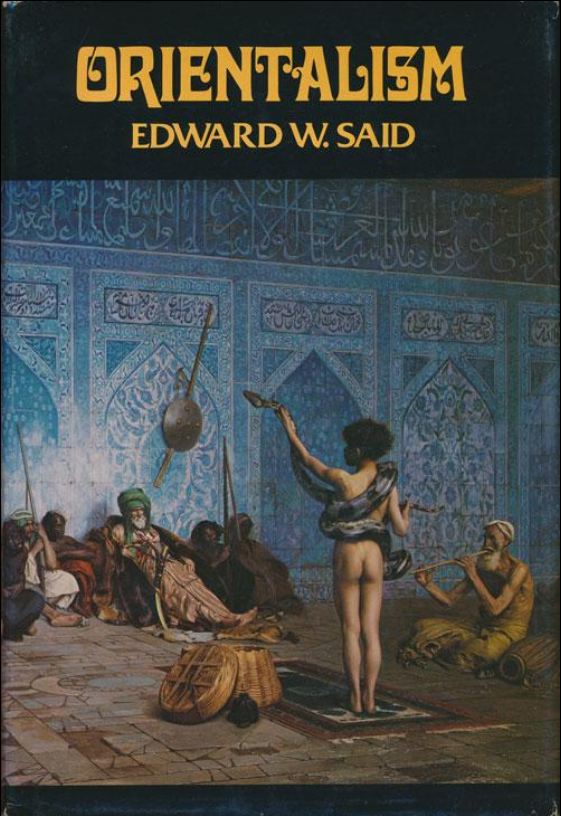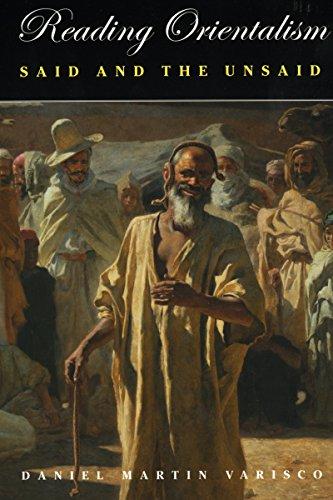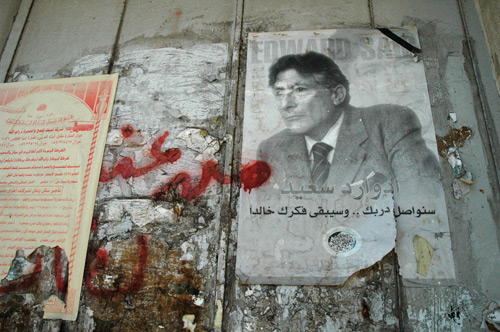Four decades ago, the Palestinian literary critic Edward Said began a crusade against the academic field of Orientalism. His text, Orientalism, still stirs debate; his target, the Orient of Western imagination, still thrives.
The Orient was always more than the direction of European colonial conquest. Tales from the Arabian Nights, Mozart’s operatic The Abduction from the Seraglio, Hollywood’s Valentino as The Sheik and Ray Stevens’ “Ahab the Arab” literally lit the stage with stereotypes. Sinbad and Aladdin rubbed shoulders with Grimm’s Fairy Tales for children. The imagined Orient in popular Western culture was full of bearded Bedouins raiding camels in the desert and Ottoman sultans dallying with their concubines in lush palaces.
For Edward Said the Orient was more than a figment of Western imagination and literature. Scholars of the Orient, he argued, were as guilty of dominating real Oriental people as British lords and French legions in the colonies. This was as true of contemporary historians like Bernard Lewis as the long-forgotten 19th century scholar Sir William Muir, a staunch Christian who speculated that Muhammad may have been under Satanic influence. Poets like Goethe and novelists like Gustave Flaubert were added to the list of cultural villains for creating an image of an Oriental, Arab and Muslim, as “inferior” and “backward.” For Said, anyone in the West who wrote about the Orient, whether scholar or novelist, necessarily viewed the Orient as inferior. He wrote his polemic as an Oriental writing back at the culture that had “wogged” him.
I first read Orientalism in 1979, having just returned from a year and a half of anthropological fieldwork in North Yemen. My training as an anthropologist, archaeologist and historian of the Middle East would place me within Said’s Orientalist camp. I agreed wholeheartedly with Said’s critique of the egregious stereotypes of many past scholars, but I wrote at the time in my copy’s margin that the author was in a sense “beating a dead horse.” Admittedly the horse was not completely dead, nor could such stereotypes ever be killed off, but many young scholars my age were already rebelling against them. My ethnographic experience among rural Yemeni farmers overcame all the National Geographic stereotypes I had been exposed to in my youth. My Ivy League professor of Arabic historiography, George Makdisi, did not fit Said’s menagerie of bad-faith Orientalists. The term “Orientalism” had been abandoned by most scholars, along with the misnomer “Muhammadism” for Islam.
In 2007 I published Reading Orientalism: Said and the Unsaid, a critical review of Said’s Orientalism and the acrimonious debate over it. My aim was to probe the persuasive style used to create such a stir and fill in the missing history. Part of the success of Said’s book was that it presented only one side of past writing on the “Orient,” a result that the Syrian scholar Sadiq al-Azm called “Orientalism in Reverse.” Said also failed to appreciate the role of satire, ignoring Montesquieu’s The Persian Letters in its use of an Oriental metaphor to critique Parisian society, and Mark Twain’s take-down of Western tourists in Bible lands in his widely traveled Innocents Abroad.
(By the way, my book on Said’s Orientalism used a very different picture than his. Both are of a snake charmer. His fit his message perfectly, an old man staring at a naked boy wrapped in a snake. My cover’s painting, by a different artist, shows a man in total control of the snake and staring at the viewer.)


On the positive side, Said galvanized a wide range of scholars with an interest in the Middle East. The time was ripe at the end of the 1970s and start of the 1980s for a rethinking of what it meant to study the Middle East and Islam. Events in the Middle East had become part of the daily news: dependence on Saudi oil, the fall of Iran’s Shah, the Soviet invasion of Afghanistan, Palestinian resistance and the assassination of Anwar Sadat were a few of the headlines. In 1979 Said published The Question of Palestine and followed this up with Covering Islam, an analysis of how Western media reported the Iran crisis. Said, a Palestinian scholar in exile, was motivated mainly by the issue of Palestine, which he eloquently defended. Because he dared to criticize Israel, his detractors unjustly labeled him a “professor of terror,” despite the fact that he was adamant on the need for peaceful solutions to the crisis.
Said’s knowledge of the history of Oriental Studies was limited, based largely on an early study in French by Raymond Schwab. He at times misread and misquoted his texts, failing to consider those that ran counter to his argument. For example, to prove that the German poet Goethe was Orientalist in reducing Islam to pantheism, he cites a verse from Goethe’s West-östlicher Divan. The German text reads “Gottes ist der Orient, Gottes ist der Okzident,” which is a literal German translation of the Qur’anic verse which states “To God belongs the East, to God belongs the West.” Said mistranslates the German as “God is the Orient.” He would have benefited from the 19th century translation of this verse by Robert Browning: “God is of the east possessed.” Mistakes of this kind and his obvious lack of detailed knowledge about the scholars and texts he writes about compromise the text as intellectual history.
But the graver problem with Orientalism is that it is written as a polemic. Among the critics of Orientalism was Bernard Lewis, a scholar justifiably singled out for criticism by Said. Lewis was a U.S.-based British historian who had more admirers among conservative political scientists than among Middle East historians. His The Arabs in History, originally published in 1950, was a popular book on the region. In his writing Lewis focused on the golden age of the Arabs and Islam, which he argued has vanished and become a haven for terrorists. Said attacked the writings of Lewis as a “project to debunk, to whittle down, and to discredit the Arabs and Islam.” The animosity between them continued throughout the 1980s, culminating in the famous debate in 1986 at the annual meeting of the Middle East Studies Association, soon styled the “shootout at the MESA corral.” I was one of the 3,000 people who attended this showdown. Said, flanked by the journalist Christopher Hitchens, began with a set of file cards full of damning quotes from the writings of Lewis. There was no question that he had the audience, mainly young scholars and students, on his side. Lewis was almost lost for words, not prepared for attacks on his stature as a senior historian.
Unfortunately, the acrimony between Said and Lewis overshadowed the fact that many of the points made by Lewis were politically biased, especially his unwavering support for Israel, and much of Said’s persuasive style was not backed up by facts. Lewis attempted to spar, blow by blow, with Said but these personal attacks detracted from the legitimate issues of how the “Orient” was represented, pro and con. In the end both men were the lesser for it.
Forty years is enough time to wander about the wilderness of competing barbs about who best understands events in the Middle East and among Muslims. Said’s call for a sympathetic and objective approach to academic study has been heeded by most scholars. His polemic against Orientalism, even though flawed, remains important as a call to recognize and critique ethnocentrism and racism. Before his passing in 2003 Said was a passionate opponent of the mischievous “Clash of Civilizations” mantra, first proposed by Bernard Lewis in a 1990 article in the Atlantic Monthly and then popularized by political scientist Samuel Huntingon. Such clash thinking and talking have been used to justify American involvement in Afghanistan and Iraq, as well as support for a questionable “War on Terror.” Donald Trump’s foreign policy, to the extent it actually coheres as a policy, is the latest example of othering any group that is deemed by him to be anti-American. Referring to Mexican immigrants as rapists or small countries as “shit-holes” is exactly the kind of deplorable hate speech that Edward Said courageously assailed.
No crisis in the Middle East can be considered as entirely local. The map of the region was rewritten with colonialist European hands after World War I. The problem of Palestine stems back to the creation of Israel in 1948 and the failure to form a state in which all of the residents have equal rights. The latest move by the Israeli parliament to justify continued expansion of Jewish settlements in Palestinian territory makes prospects for a peaceful solution even more remote. The American invasion of Iraq, a highly developed country with excellent education and health care, so destabilized the country that it still cannot guarantee security to its citizens and is now a reliable ally of Iran. Western military support of a Saudi-Emirati coalition war has created the worst humanitarian crisis in the world, with thousands of Yemeni dead, millions threatened with famine and an ongoing cholera epidemic. Trump’s admiration for a Middle East NATO anchored by the Saudis and Emiratis against Iran guarantees that crisis conditions will continue.
There is a real clash going on, but it is between competing political and economic goals and not so-called civilizations.
Exotic images of Oriental fantasies are not going to disappear, thanks to Disney movies, video games and popular writing. Unfortunately, the fact that most academic scholars in Middle East Studies no longer peddle the kind of Orientalist bias criticized by Said does not translate into political action. The crisis in Syria, following the much-touted Arab Spring, released a flood of refugees into Europe. This has encouraged anti-immigrant sentiments throughout Europe, parallel to the “Make American Great Again” (and screw everyone else) mentality of Donald Trump.
Even when the Trump era is replaced, the underlying bias in America against certain others (especially Mexicans, Muslims and Jews) will not disappear. It is still important for scholars to counter stereotypes with information on the variety of ways real people think and act.






